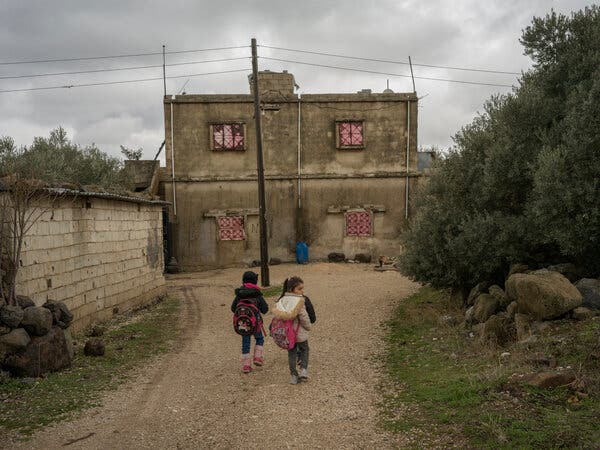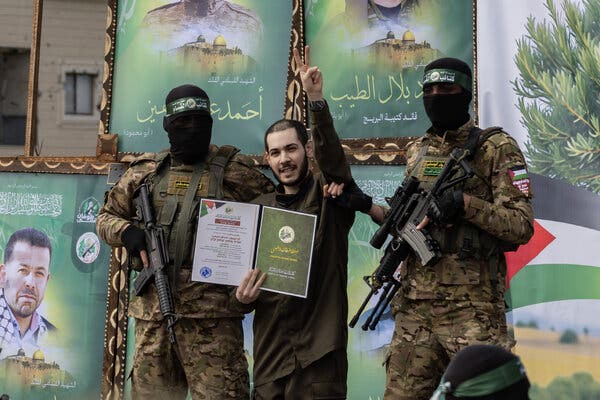Leonard Peltier, sentenced to two life terms 45 years ago in the shooting of two F.B.I. agents, is now 77 and in poor health.

Supporters carried a large painting of Leonard Peltier, whom many Native American activists consider a political prisoner, during a march for the National Day of Mourning in Plymouth, Mass., in 2001.
WASHINGTON — Since 1977, Leonard Peltier, a Native American activist, has been serving two life sentences in federal prison for his role in the killings of two F.B.I. agents during a shootout in 1975 on the Pine Ridge reservation in South Dakota — a punishment that his supporters have long held was the product of an unfair prosecution and a flawed trial.
Now his backers, including members of Congress, are making what they consider a last-ditch effort to win clemency for Mr. Peltier, who is 77 and suffering from diabetes, hypertension, partial blindness from a stroke, and an aortic aneurysm. Mr. Peltier, whom many Native American activists consider a political prisoner, also recently tested positive for the coronavirus.
Efforts to overturn his conviction over the years have failed, as have campaigns for a pardon or commutation of his sentence. Presidents Bill Clinton and Barack Obama both left office without acting on pleas to grant him clemency, Mr. Clinton after hundreds of former and current F.B.I. agents angrily marched to the White House to protest his considering such a move and the bureau’s director at the time made his opposition clear.
Representative Raúl M. Grijalva, Democrat of Arizona, has sent letters to the White House on Mr. Peltier’s behalf, including one last month after he tested positive for Covid-19. That letter was signed by eight other members of Congress. Mr. Peltier’s lawyer is also pursuing the issue through the regular clemency process at the Justice Department.
It is not clear whether President Biden would consider the clemency request. The White House did not respond to a request for comment. The F.B.I. declined to comment on whether it would now oppose commuting Mr. Peltier’s sentences.
Mr. Peltier’s fight for freedom has long drawn support from global activists and celebrities, including Nelson Mandela, the Dalai Lama, and the actors Robert Redford and Danny Glover.
Alli McCracken Jarrar, a human rights campaigner with Amnesty International, said the organization had campaigned for Mr. Peltier’s release for years, hoping to undo what the organization considered an abuse of the criminal justice system.
“For the last 44 years, prominent individuals and prominent organizations have called on president after president to grant him clemency,” she said. “It is long past due for him to be given clemency, so he can live the remaining years of his life with his community.”
Mr. Peltier grew up on the Turtle Mountain Indian Reservation in North Dakota; members of the tribe say they will take care of him if he is released.
The deadly confrontation that put Mr. Peltier in prison took place at a ranch on the Pine Ridge reservation, about 10 miles from Wounded Knee, where U.S. soldiers had massacred hundreds of unarmed Lakota nearly a century earlier.
Native American activists returned to occupy the village during a drawn-out protest in 1973, in hopes of forcing the federal government to investigate what they said was corruption in the leadership of the Oglala Sioux Tribe, treaty violations and problems with the Bureau of Indian Affairs.
Two F.B.I. agents, Jack Coler and Ronald Williams, died in the shootout. One of the activists was also killed, but his death was never investigated.
Mr. Peltier belonged to the American Indian Movement, which sought to draw attention to federal violations of Native American treaty rights; he was found guilty of the killings in 1977 and has since been in federal prison, currently in Florida.
ImageLeonard Peltier, at the U.S. Penitentiary at Leavenworth, Kan., in 1999. Mr. Peltier, who is now 77, has multiple health problems and recently tested positive for the coronavirus.Credit… Joe Ledford/The Kansas City Star, via Associated Press
He has admitted to participating in the shootout in self-defense, but says he did not kill the agents. He and his supporters also say that F.B.I. agents coerced witnesses, and that prosecutors withheld exculpatory evidence while extraditing Mr. Peltier from Canada and trying him in North Dakota.
Mr. Peltier’s arrest came at a time of intense unrest on the Pine Ridge Reservation.
On Feb. 27, 1973, Oglala Lakota activists and members of the American Indian Movement seized control of Wounded Knee to draw attention to the federal government’s violations of the treaty rights and a tribal president accused of corruption and aligning with the federal government.
The resulting 71-day armed conflict between Native Americans and federal law enforcement at Wounded Knee left two activists dead, and a federal agent shot and paralyzed.
Even after the siege, conflict on the Pine Ridge Reservation continued. Murders were frequent, and the federal and tribal police forces on the reservation behaved like a paramilitary force. Then came the shootout on the Pine Ridge reservation in 1975, where the two F.B.I. agents and a Native American activist were killed, resulting eventually in the charges against Mr. Peltier and two others implicated in the deaths of the agents.
Mr. Peltier’s co-defendants were found not guilty of murdering the agents after they argued self-defense. They were tried in Iowa, while Mr. Peltier was tried in North Dakota, where the judge blocked some evidence that was allowed in the Iowa case.
Years of appeals have poked holes in the government’s case against him, Mr. Peltier’s supporters say.
His conviction rests solely on the fact that he was present at the shootout with a weapon that day — not that he fired a fatal shot or had any hand in killing anyone, said James Reynolds, a former U.S. attorney in Iowa whose predecessor, Evan Hultman, handled the original prosecution of Mr. Peltier.
Mr. Reynolds is among those who have lobbied for Mr. Peltier’s release, writing letters to both the Obama and Trump administrations. He said that, while the U.S. Court of Appeals for the Eighth Circuit found Mr. Peltier had a fair trial, he no longer believed that to be the case.
“How much stuff does he need to have on his side before you say enough is enough,” Mr. Reynolds said. “They’ve been fighting this thing for more than 40 years and it seems unfortunate this is the government position.”
Kevin Sharp, Mr. Peltier’s lawyer, said granting him clemency could be a major step toward healing the rift between Native Americans and the federal government.
“The important thing is breaking from the past,” Mr. Sharp said. “The F.B.I. will say they are no longer the J. Edgar Hoover F.B.I. I believe them when they say that. But if you really want to break from the J. Edgar Hoover F.B.I., they need to release this prisoner.”
Ruth Anna Buffalo, a citizen of the Mandan, Hidatsa, and Arikara Nation, and a state representative in North Dakota, was among two dozen Native American state legislators who signed a letter to Mr. Biden in October requesting clemency of Mr. Peltier.
She said the president had yet to include Native Americans in his administration’s efforts to overhaul aspects of the federal justice system. Granting clemency to Mr. Peltier would be a step in the right direction, she said.
“We are not asking for special treatment,” Ms. Buffalo said. “We are asking to be treated as human beings. None of us are free until Leonard is free.”
Source: nytimes.com



